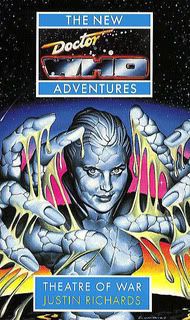
Theatre of War by Justin Richards
In Brief: It's the year 3985 and Benny is taking a break from the Tardis to explore an archaeological dig on the planet Menaxus, one-time home of a theatre-loving civilization. However with murders, ghosts, mud-monsters and a lost-for-centuries play rearing their heads it may be time to call in the Doctor.
Theatre of War was a bit of a light read, but a very good one. After the *ahem* indulgence of Legacy in its use of Doctor Who's past it was good again to get a *new* adventure that didn't feel like an author showing off how well they know their video collection. The book also starts to lay down some of the foundations that become important later in the series, with as the introduction of Irving Braxiatel (mega-wealthy potential Time-Lord) and Benny really taking the lead for much of the book (basically she does all of the normal Doctor stuff like finding out what is actually going on).
Having decided at the end of Legacy to temporarily leave the Tardis (albeit with a temporal "pager" to let the Doctor know to pick her up, thankfully no tacky cell-phone) the book starts with Benny joining a dig to Menaxus 5 years after a previous attempt ended in disaster. The first third to half of the book is the best part, as the mystery of the dig into an ancient theatre keeps the interest. Actually it's interesting enough that I didn't even realise that the first scene with the Doctor (And New-Ace, but as ever she's best ignored) doesn't even happen until a quarter of the way through the book. Bernice for the most part really starts to become the central character of the series here as the main reader-identification character.
But "seeing" events through someone other than the Doctor is (IMHO) necessary, as it both helps to maintain the mystery of his character as well keep the plot rolling. The more manipulative 7th-Doctor was all about plans and pre-plans, so knowing too much in advance could reduce the reader's interest (and probably the page count). The Doctor has strangely *never* been the most interesting character on the show (even back in the 60s we really had "The Barbara & Ian/Jamie & Zoe Show (with the Doctor)". So complaints that keepingfocus away from the Doctor is somehow a post-2005 thing slightly irks me.
But back to the book. Much of it surrounds the main find at the dig, a "dream machine" that can holographically show a pre-set selection of plays. That one of these plays is a centuries-old "lost classic" I suspect is the author's attempt to echo the then-recent rediscovery of 60s Who story "The Tomb of the Cybermen", especially with the discovery that it's actually a bit rubbish.
Think if the movie Avatar were to somehow be lost for a few hundred years with only current reviews and a trailer to give future audiences a sense of what it was like. Reality would be a bit of a let down.
But then of course the whole thing turns out to be a massive trap, albeit not in the way that the Doctor was expecting.
And the Doctor actually gets things a bit *wrong* in Theatre of War and ends up being corrected by Bernice. It's refreshing to see considering how used we are to the bugger being right all of the time.
Revealing any more would give away too much of the twists that made the book so enjoyable, and I would want to ruin that for the one or two of you out there who may some day read the thing.
I did enjoy Theatre of War quite a bit with only a couple of minor problems getting in the way. Richards' isn't the best at characterisation (it's a bit melodramatic, but then that could be on purpose with the very theatrical-centred story) and I lost track a couple of times of who certain characters were since he threw maybe a couple too many into the book at time. Also, the story does lose a bit of steam when the Dream Machine is moved to the Nazi-esque world of Heletia for the showing of the lost play. But these are minor niggles in what is a very solid entry and one that lays some good ground-work for the future. It all feels like *finally* the publishers are realising that a good Doctor Who story *doesn't* have to involve a monster/story/character from 1963-1989 in every novel.
No comments:
Post a Comment